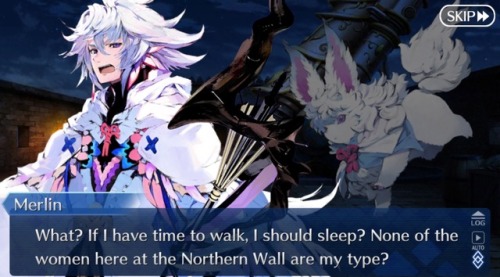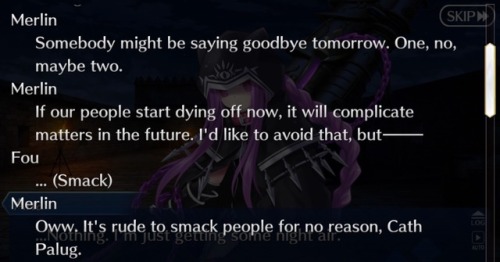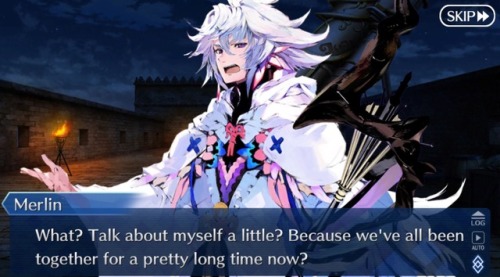- Legend of King Arthur (not Fate)
- Merlin (not Fate)
Fate version:
Arthuria was born during the war-torn Dark Ages after Britannia lost its protection from the Roman Empire. During this time, Uther Pendragon was the King of Britain and he had already fathered a daughter (Morgan le Fay).
Merlin, an Human-Incubus Hyrbid and a powerful Magus, had prophesied that their next child would be Uther's successor and Uther believed this. However, when Arthuria was born, Uther despaired as she was born a girl, not a boy. In those times, a King could not make a child that was not a male his successor even if she was fated to one day become a king. Merlin was delighted because the sex of the child had never mattered and he was confident that if Arthuria was separated from the castle until the day of prophecy, it would be proof that she would become king.
At the age of five, Arthuria was entrusted to one of the king's vassals, Sir Ector, who while he did not believe in the prophecy, he did feel the same air from the young Arthuria as he did his king. Arthuria was then adopted and raised with Ector's own son Kay training them both as simple knight apprentices.
Kay could tell that Arthuria would grow up to be a beautiful woman but his father told him to guide her like she was his brother and decided to treat her in that manner, though he did not believe it would be kept secret. Initially, Arthuria was raised under the belief that she and Kay were related by blood but she was later told the truth while growing up. Despite this their relationship did not diminish from the truth, and they still felt they were true siblings.
Arthuria acted as Kay's squire and received training from him while also doing other chores such as pulling along his horse. During their sparring, Arthuria was the greater in terms of swordsmanship however Kay would use "warped reasoning just on the verge of being correct" to make her feel like she had lost despite winning, reasoning like:
"You lose since you threw away your sheath!"
"I'm still alive so don't act like you won!"
While Arthuria was being raised by Ector, Merlin also visited teaching Arthuria and acting as a father figure to her. He also also revealed Arthuria's gender to Kay making him swear to secrecy.
When Arthuria was 15, the day of prophecy arrived and Merlin prepared Caliburn for the selection of the next king. When the Knights and Lords gathered for the selection of the next king, they expected the selection to be through jousting to select the most superior one to become a king, but they were presented with Caliburn stuck in a stone with the inscription on the hilt reading:
Whosoe'er pulleth out this sword of this stone is rightwise king born of England.
While many knights grabbed the sword trying to follow the command, none was able to pull it out. With no successful attempts, they began the expected jousting to make the selection. At this time, Arthuria was still an apprentice and thus not qualified to joust. She walked to the now deserted stone and reached out for the sword without hesitation.
Before she started grabbing it, Merlin appeared before her to tell her to think things over before taking it. He told her she would no longer be human upon taking the sword, but she had been prepared for the fact that "becoming a king means no longer being human" ever since she was born knowing that a king is someone who kills everyone to protect everyone, having thought about it every night and shuddered until morning came with not a day passing where she did not fear that fact. To Merlin, her response was a nod saying that the fear she has felt would end then Arthuria pulled the sword out effortlessly as per her fate and in that instant, she became something not human. To everyone else there, so long as she acted like a good king, no one would care for her appearance or gender. Taking the sword also had an effect on her body stopping her from aging as such from then on the King would have a body of a 15 year old.
After that Arthuria, Merlin and Kay went through various adventures while training the rightful King of the country while reclaiming the country and the 3 of them formed the Round Table but later was joined by Bedivere and Gawain who along with Kay became the most senior knights.
Morgan le Fay, who was born as the proper, recognized daughter of King Uther and Arthuria's older sister of the same status, in her eyes believed Arthuria received the love and hope of their father that should have been hers, became a witch queen who craved for vengeance. After Merlin taught her so much she became "the wisest woman in the world", Morgan betrayed Merlin away by threatening to torture and kill him. During their adventures, Morgan executed a trap which saw Arthuria lose Caliburn.
After the final battle against her uncle Vortigern, Arthuria claimed her kingdom Camelot and spent 10 years in peace. During this time, Arthuria had to deal with the problem of being able to produce an heir. To help, Merlin used his magecraft to make Arthuria into a pseudo-male capable of producing sperm for an unknown duration of time. During this time, however, Morgan le Fay used her magic to enchant her sister to take some of her sperms. Using her own ovaries, Morgan developed the sperm and have birth to a homunculus clone of her sister, named
Mordred.
Arthuria met the daughter of King Leodegrance,
Guinevere, and the 2 wedded to make an outward appearance of a "kingdom" in Britain. They even held a grand wedding ceremony that lasted close to 7 days and was celebrated throughout the land. However, it was a marriage out of necessity rather than love, where Arthuria, the "husband", was not a man and the marriage would never be consummated.
During this time,
Mordred was raised by Morgan to believe it was her right defeat the King and inherit the throne. Through her mother's recommendations and a presentation of her own swordsmanship, was able to be counted as one of the Knights of the Round Table. Despite her mother's obsessive hatred for Arthuria, Mordred never hated Arthuria yet idealized her as the perfect king. She later learned of her heritage of being Arthuria's "son" and was happy in learning that she shared the same blood as the king she idolized, however Mordred also felt ashamed of her twisted birth.
As Arthuria continued to be king, she kept to the oath that a king is not human and that one cannot protect the people with human emotions. Never narrowing her eyes in grief while on the throne and settling every problem while working hard in government affairs, Arthuria managed to balance the country without any deviations, and punished people without a single mistake. This however lead one of her Knight, Sir Tristan, to leave Camelot saying:
The King does not understand how others feel.
Hearing this, Lancelot wished to lessen the burden for his King, a wish that Guinevere also held. While they conversed with each other, they came to recognize each other as friends and it was then that Lancelot began to fall for Guinevere. It was through Guinevere that he learned of Arthuria being a woman and the true meaning to Guinevere's marriage to her.
At some point in time, Mordred approached Arthuria about her identity and her "son" but rather getting the acceptance she had hoped for Arthuria rejected her stating that while Mordred was her child born from her and Morgan's plotting, she could not recognize Mordred as her "son" or give her the Throne. Mordred believed this was because Arthuria hated Morgan and no matter what she did, the moment she was born from Morgan, she was a dirty child and the shame of her birth began to become hatred.
Lancelot and Guinevere began to have an affair and this was discovered by Agravain, one of Arthuria's Knights, and an assassin hired by Morgan whom he hated. Agravain was loyal to the King, however, he hated women due to Morgan and when he uncovered the affair, he also learned of Arthuria's true gender. He tried to threaten Guinevere with the fact of her affair but failed. Before his death and seeing Mordred's growing hatred (while probably not knowing Mordred was a woman as well), he revealed the affair to her who used it to sow mistrust in the Knights of the Round Table and destroying the prestige of the King in the eyes of the people.
When Arthuria learned of the affair, she did not blame anyone but rather understood knowing Guinevere's and Lancelot's sacrifice. However, still acting in the capacity of a king and this times adultery was a serious crime, Arthuria discarded her emotions and had Guinevere executed. Lancelot tried to save her, killing several of his fellow knights including Gawain's brothers, Gareth and Gaheris, but ultimately failed and fled to his homeland of France.
When Arthuria left for the Rome expedition, Mordred became the leader of the rebellion representing the national discontent towards the King. When Arthuria returned, Mordred raged and proclaimed her hatred of the king and that only she was fit for the throne. The truth was that she only wanted to be accepted by Arthuria as her "son". This sparked the civil war that would later claim their lives.
Shortly before the final battle of Camlann Avalon, the sheath to Excalibur that gave Arthuria immortality, was stolen due to the machinations of Morgan le Fay. Lancelot, even after being excommunicated, wanted to participate in the Battle of Camlann to serve his King but Gawain hostilely rejected him.
Merlin left Arthuria before the final battle because he claimed that an evil witch (Morgan? Lady of the Lake?) tried to murder him so he fled to the Reverse Side of the World and thus the land of Avalon where he thought the witch couldn't reach him; however, the gate he encountered was a trap which created a sealing "tower" called the "Garden of Avalon", and having transcended death, is trapped for all eternity.
During their final battle, Mordred hated the "Son of Morgan" but Arthuria replied: "Not once did I despise you. There was only one reason I would not give you the throne. You didn't have the capacity of a King."
In their battle, Mordred was fatally wounded by Rhongomyniad but because of a curse on her, still swung her sword and fatally wounded Arturia.
Arthuria's dying body was escorted to a holy isle by Sir Bedivere where she ordered a grieving knight to dispose of Excalibur by throwing it back to the Lady of the Lake, an order he failed twice believing that the moment Excalibur was returned to Vivian, Arthuria would die.
In Bedivere's absence, she reflected on her personal failures, regretting her life as king.
Before her last breath, she appealed to the world; in exchange for services as a Heroic Spirit, she asked to be given an opportunity seek the Holy Grail to save her country.
source







